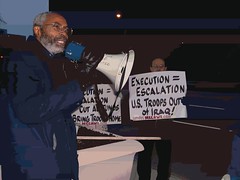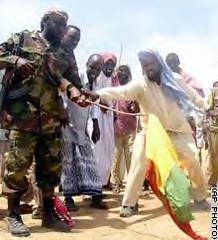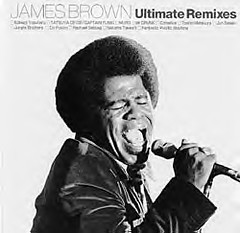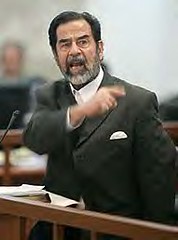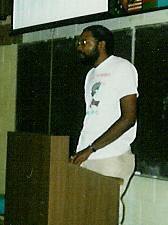PANW Editor's Note: The death of former US President Gerald R. Ford has led to the propagation of many myths about the character of American policy during this period. Ford became notable as a member of the Warren Commission which engaged in a massive cover-up of the Kennedy assassination, declaring that this act was not a result of a conspiracy. He would later become vice-president and president after the demise of Spiro Agnew and later Richard Nixon, both of whom were forced from office as a result of massive scandals.
The following research report was originally written in 2002 and an edited version appeared as a lead article in the African Institute of South Africa's peer-reviewed journal, Africa Insight, Vol. 31, No 2, published in June of that year. It was published under the title: Henry Kissinger's War Crimes in Africa: The Consequences of Nixon/Ford Policy in the region."
----------------------------------------------------------------------------------------
Henry Kissinger’s War Crimes in Africa Should Not be
Forgotten
Nixon/Ford Policy on region led to prolonged war and mass
killings
By Abayomi Azikiwe,
Pan-African News Wire
A recent attempt to question Henry A. Kissinger in a court of
law in the United Kingdom flowed from alleged war crimes
committed by the former National Security Adviser and later
Secretary of State who served the Richard M. Nixon
administration and the subsequent Gerald R. Ford
administration during the years of 1969-1977. The crimes
that were cited by the plantiff stemmed from the policy
decisions made by the Nixon and Ford administrations that
affected the peoples of Vietnam, Cambodia and Laos.
Peter Tatchell in a letter to the Guardian newspaper in
Britain on April 25, said that “I lost my bid to have the
former US secretary of state, Henry Kissinger, prosecuted on
charges of war crimes in Indochina, but there is good reason
to hope that a future, better prepared attempt might
succeed.” (1)
Tatchell points out in the letter that as the National
Security Advisor to President Nixon from the years of 1969-
73, and later during the second administration of Nixon,
where he served as US Secretary of State from 1973-74, and
after the resignation of Nixon in the midst of an impeachment
investigation, Kissinger continued to serve in this capacity
under Gerald R. Ford’s presidency between 1974-1977,
Kissinger personally directed military actions that would
knowingly result in the deaths of innocent civilians.
During this period Kissinger was the principal architect of
US military policy in Vietnam, Laos and Cambodia.
Tatchell writes that “according to the US Senate sub-
committee on refugees, from March 1969 to March 1972 , in
excess of three million civilians were killed, wounded or
made homeless.” Also during this period, the US launched
approximately 4.5 million tones of high explosives on
Cambodia, Laos and Vietnam, which was 200% more than all of
the bombs used during the entire period of World War II.
“What the US did in Indochina involved the mass killing of
civilians and the premeditated, wholesale destruction of the
environment using chemical defoliants such as Agent Orange,”
Tatchell noted. These actions taken by a government had been
declared as war crimes under the 1957 Geneva Conventions
Act. These mass killings were carried out in part utilizing
the B-52 bomber that flew flights so high that the planes
could not be seen from the ground, which gave no warning to
civilians that their villages and towns were under attack.
These planes were highly inaccurate in their targeting of
supposed military bases of the national liberation forces
fighting the US occupation in the region. Nonetheless,
between March 1969 and May 1970, there were 3,630 American
bombing raids over the nation of Cambodia.
These facts related to Kissinger’s war crimes in Indochina
are taken from a book by author Christopher Hitchens
entitled: “The Trial of Henry Kissinger,” (2) that was
published by Verso press in London during 2001. Hitchen’s findings, that were utilized by Tactchell in his legal challenge to
Kissinger, indicate that “during the first 30 months of the
Nixon-Kissinger administration, the US counter-insurgency
‘Phoenix Program’ was responsible for the murder
or abduction of 35,708 Vietnamese civilians.”
In addition, American bombing missions in the region were
estimated to have killed 350,000 non-combatants in Laos and
approximately 600,000 in Cambodia. Other crimes during the
US war in Indochina involved the systematic use of chemical
agents aimed at destroying the peoples’ will to resist the
military occupation. Tactchell says that “Kissinger’s role
in formulating and implementing US war policy coincided with
the systematic use of chemical defoliants and pesticides,
including Agent Orange.”
He continues by pointing out that “[T]hese caused birth
defects and rendered significant areas of Vietnam, Laos and
Cambodia too toxic for people to live in or farm—creating an
environmental disaster that will continue to affect many
generations to come.”
There are of course other crimes that Kissinger must be
questioned about including the US involvement in the 1973
coup against Chilean president Salvador Allende, which
resulted in the assassination of the head of state of this
South American nation and the subsequent massacre and
imprisonment of thousands of citizens of that country. (3)
Also the Indonesian invasion and seizure of East Timor which
resulted in the deaths of hundreds of thousands of people.
This intervention was given the “green light” by the Ford
administration in 1975, in which Kissinger served as
Secretary of State. East Timor, a former Portuguese colony
in the Indonesian archipalago, had its independence delayed
by more than a quarter of a century because of the actions
taken by the US and its ally, the government of Indonesia,
in this region. (4)
However, what must never be forgotten is the role of Henry
Kissinger during the Nixon and Ford administrations involving
the suppression and subversion of the national liberation
struggles in Africa, principally in the sub-continent. The
crimes committed in this region have had an equal, if not
greater, impact on the continued underdevelopment and
instability in existence on the African continent than what
has transpired in other geo-political areas.
Kissinger stated in a speech during a recent trip to the UK
that: “No one can say that he served in an administration
that did not make mistakes. The decisions made in high
office are usually 51-49 decisions, so it is quite possible
that mistakes were made. The issue is whether 30 years after
the event courts are the appropriate means by which this
determination is made.” (5)
Yet if the courts are not the best place to address such
issues then what is the most appropriate venue? This
question and others must be grappled with in order to seek
solutions to the contemporary challenges facing these geo-
political regions that have largely resulted from the policy
decisions carried by previous US administrations.
The US Role in the Portuguese-African Wars During the
Nixon/Kissinger Years
When Nixon first came to power in early 1969, Kissinger in
his capacity as National Security Adviser to the new
administration, immediately commissioned a study of the
current attempts aimed at national liberation in Africa.
The National Security Council Interdepartmental Group for
Africa, in which Kissinger served as Secretary, issued a
secret report on April 10, 1969 in which the contours of US
policy towards Africa would be guided over the next five
years.
This secret report was named National Security Study
Memorandum, No. 39 (6) and it was designed to rationalize an
escalation of support for Portuguese colonial rule in Africa
as well as to fortify the political and economic positions of
the white settler-colonial regimes then operating in
Rhodesia, South-west Africa and the Republic of South
Africa. With the US was carrying out a war against the
national liberation struggles in Indochina, a similar war
being waged by nationalist forces in the Portuguese colonial
territories on the African continent would make the two
nations natural allies. In addition, Portugal was also a
member of the North Atlantic Treaty Organization (NATO)
which was established with American dominance after the
conclusion of World War II and the beginning of the so-
called “Cold War.”
This report, which was circulated by Kissinger to the
Secretary of State, Secretary of Defense and the Director of
Central Intelligence (CIA), incorrectly concluded as it
related to the national liberation movements on the continent
that: “[T]he blacks cannot gain political rights through
violence. Constructive change can come only by acquiescence
of the whites.” As a result of this line of thinking
fostered by Kissinger, the NSSM memorandum came up with five
potential policy options for the United States government to
follow in regard to its policy in southern Africa and other
contested regions.
According to a summary of the report by Mohamad El-Khawas
and Barry Cohen, the options can be summed up as follows:
“To improve the US standing in black Africa and
internationally on the racial issue;
To minimize the likelihood of escalation of violence in the
area and risk of US involvement;
To minimize the opportunities for the USSR and Communist
China to exploit the racial issue in the region for
propaganda advantage and to gain political influence with
black governments and liberation movements;
To encourage moderation of the current rigid racial and
colonial policies of the white regimes;
To protect economic, scientific and strategic interests and
opportunities in the region, including the orderly marketing
of South Africa’s gold production.”
These options drafted in 1969 and implemented thereafter does
not give any consideration to the national liberation
movements representing the will of the African peoples in
their struggle for self-determination and independence. Such
a set of policy options led to the escalation of financial
and military support to the Portuguese colonial regime by the
United States and NATO. The policy implications contained in
NSSM, 39 emanated from the so-called “Nixon Doctrine” which
sought to reinforce a western anti-communist alliance with
each respective ally sharing responsibility within its
sphere of influence.
Such an approach to the existence of colonialism during the
late 1960s was clearly designed to perpetuate the continuance
of imperialism in Africa. Such a policy was welcome news to
the then Prime Minister of Portugal Marcello Caetano, who
recognized the Nixon call for the assumption of regional
control by various colonial and imperialists nations as a
means to secure firm NATO support for the war in the so-
called “overseas territories.” In 1970, Caetano stated in
his book entitled: “Guidelines of Foreign Policy,”
that: “The West is a bloc, but this solidarity cannot be
limited to a few matters located on the territory of Europe….
At all times and everywhere in the world its values or vital
interests are threatened, we have the duty of defending
them.” (7)
In line with this Nixon/Kissinger foreign policy
orientation , the use of the Azores island base for US
military activity became a focal point of discussion and
cooperation between America and Portugal. In March of 1971
Caetano seemed to be saying that the US use of the Azores
base would not continue without the drafting of a formal
agreement. If this could not be done, the Portuguese leader
proposed that the base could only be used as a outpost for
exclusively NATO operations. However, by December of 1971 an
agreement had been reached which proved to be a lucrative
deal for the Portuguese government of Caetano.
According to John Marcum’s “Portugal and Africa: The Politics
of Indifference” published in 1972, (8) the US government,
in exchange for the usage of the Azores base, had authorized the
Export-Import Bank to grant loans to Portugal for the amount
of $436 million, a sum of money that was 400% greater than
the total funds loaned to Portugal between the years of 1946
through 1971. Such an influx of capital into Portugal
enabled the colonial state to prolong the war through the
purchasing of sophisticated NATO weaponry, which was
largely used against the civilian populations in Guinea-
Bissau, Mozambique and Angola.
Nonetheless, the guerrilla movements in the Portuguese
colonies continued to escalate their struggle during the
course of the Nixon/Kissinger administration which proved
disastrous for the policy initiatives put forward in the NSSM
39 secret document. By 1974, a total of 7,674 Portuguese
soldiers had been killed in action in Africa. The expense
associated with the war was costing the Portuguese government
over 50% of its annual budget, a country which was considered
the poorest in Europe. A total estimated cost for the
colonial war against the forces of national liberation in
Guinea, Mozambique and Angola was $5 billion. (9)
Accurate figures for the casualties on the Africa side during the
Portuguese colonial war are not readily available but they
no doubt run into the tens of thousands--with the bombing of
civilian areas in all three contested colonies involving
NATO ordinances that destroyed towns and villages. Any
assessment of the war must also take into consideration the
massive dislocation of civilian population groups who fled as
refugees from the bombings by Portugal and their Rhodesian
and apartheid South African allies. These refugees settled
in neighboring countries such as Zambia, Tanzania and Guinea-
Conakry.
Consequently, the immediate impact of the strategic vision
emanating from NSSM 39 was an intensification and
broadening of the colonial wars in Africa as represented by
the massive casualties endured by the peoples of Angola,
Mozambique and Guinea-Bissau. A racist believe that Africans
could not successfully wage a revolutionary war against
European colonialists on the continent led to the genocidal
policy of the Portuguese regime under Caetano. However, the
immense costs in both financial and human resources in
Portugal led to the April 25, 1974 military coup which
effectively ended the war against the liberation movements in
Africa. Dissident military offers cited the hopeless efforts
by Portugal to defeat the African liberation movements as the
main incentive for the seizure of power from Caetano.
Despite these setbacks for the US government, the
administration continued to pursue a failed foreign policy
towards the African continent.
Kissinger Engineers a Civil War in Angola
In the main theaters of the guerrilla war in the former
Portuguese colonies the liberation movements had struggled
for over a decade for a unified front against the imperialist
states. These objectives were largely achieved in the
colonies of Guinea-Bissau/Cape Verde and Mozambique. In
Guinea, the African Party for the Independence of Guinea and
Cape Verde (PAIGC) was headed by Amilcar Cabral, an
agricultural engineer who made tremendous contributions to
the theoretical basis for the armed revolutionary phase of
the liberation movements on the continent. In Mozambique,
the Front for the Liberation of Mozambique (FRELIMO), became
the undisputed leader in the national movement in this
southern African nation. Samora Machel eventually took
control of FRELIMO after the assassination of Eduardo
Monlande, the first leader of the movement who was educated
in the United States.
Nonetheless, in Angola, the US and its allies, including
Portugal, attempted to create two alternatives to the Popular
Movement for the Liberation of Angola (MPLA). Holden
Roberto, who headed the Front for the National Liberation of
Angola (FNLA) had close ties with the west through its bases
in Zaire (now known as the Democratic Republic of Congo).
The Union for the Total Independence of Angola (UNITA) was
based in the country of Angola and even collaborated with the
colonialist during the concluding years of the war. Jonas
Savimbi, the UNITA leader who was finally killed in 2002,
became the darling of the United States government and the
apartheid regime in South Africa.
US governmental support for Holden Roberto extends back to at
least 1961, (10) according to declassified State Department
documents from the Kennedy administration. In regard to
UNITA, a series of letters between Jonas Savimbi and the
Portuguese military leadership dating as far back as 1972
were revealed in the Afrique-Asie publication of July 8,
1974. (11) In one of these letters from Savimbi to General
Luz Cunha dated September 26, 1972, he states that: “We are no
longer interested in the OAU (Organization of African Unity),
nor in Zambia, and even less in alliances with the MPLA. If
these aspects of UNITA’s policies are not yet sufficiently
clear for the authorities in Angola and Portugal, it is still
an irrefutable fact: we have actively participated in the
weakening of the MPLA in regions of the east.”
The letter continues by saying that: “We use our arms so that
one day we will force the MPLA to abandon the east.” Savimbi
then lays out a series of proposals which he thinks will
bring peace to the eastern region of Angola. His first
recommendation to the Portuguese General Luz Cunha was to
bring about the “weakening of MPLA forces within Angola to
lead to their liquidation. This task can be accomplished by
the combined efforts of the military forces and the forces of
UNITA,” Savimbi claimed in the letter.
He also makes a second suggestion involving “the liquidation
of MPLA camps in the border areas of Zambia.” He says
that “this can be more easily accomplished by UNITA because
we have no political status which would lead to censure by an
international organization. Our plans are beyond the
preliminary stage,” Savimbi stated.
The UNITA leader finally suggests that an effort take place
to “discredit the MPLA.” He continues by saying that “in this regard, we are also aiming at the OAU, at least as concerns liberation
movements. Once the MPLA is weakened or liquidated in the
east, great horizons are open to us.”
Obviously this letter implies a strategic alliance between
Savimbi, the ostensible liberation movement leader, and the
Portuguese colonial authorities designed to isolate and
liquidate the MPLA, which had been considered a threat by the
western nations, including the United States are far back as
the early 1960s. Consequently, after the overthrow of
Caetano in April of 1974, the Nixon-Kissinger administration
was keen to prevent the consolidation of power by the MPLA
inside of Angola.
This desire to prevent the MPLA from coming to power in
Angola in 1975 eventually led to commencement of the civil
war in that country which lasted all but a few years during
the course of its 27 years of independence. In 1975 the US
government had suffered a humiliating defeat in Indochina
with the consolidation of power by the national liberation
movements and the communist parties of Vietnam, Cambodia and
Laos. With the independence of Guinea-Bissau in 1974 and
Mozambique in June of 1975, the existence of FNLA and UNITA
in Angola provided an opportunity for the US to destabilize
the Angolan revolution and consequently stifle the total
liberation of southern Africa.
What served as a public relations disaster for the Nixon-
Kissinger administration was the exposure of its open
alliance with the apartheid regime in South Africa and South-
west Africa (renamed Namibia) during 1975-76 in their efforts
to prevent the consolidation of power by the MPLA in
Angola.
Although links between the South African intelligence
services known then as the Bureau of State Security (BOSS)
and the American Central Intelligence Agency extends back
until at least the late 1960s, this relationship had been
kept from public view, clouded by the diplomatic position
that the US did support the concept of majority rule.
However, despite this diplomatic posture, the machinations of
the State Department, the National Security Council and the
Central Intelligence Agency were designed to frustrate and
subvert the activities of the independence movements. (12)
In regard to a book released in early 2002 entitled:
“Conflicting Missions: Havana, Washington, and Africa, 1959-
1976, published Piero Gleijeses, (13) Peter Kornbluh of the
National Security Archive’s Cuba Documentation Project,
says that this historical study provides further proof of the US
collaboration with the racist apartheid regime in South
Africa to prevent an independence movement from coming to
power in Angola and subsequently engineering a civil war
which had grave implications for the social and political
stability of the country and the entire region of southern
Africa.
Kornbluh, based on the release of the documents published by
Gleijeses, claims that:
-“Castro decided to send troops to Angola on November 4,
1975, in response to the South African invasion of that
country, rather than vice versa as the Ford administration
persistently claimed;
-The United States knew about South Africa’s covert invasion
plans, and collaborated militarily with its troops, contrary
to what Secretary of State Henry Kissinger testified before
Congress and wrote in his memoirs;
-Cuba made the decision to send troops without informing the
Soviet Union and deployed them, contrary to what was widely
alleged, without any Soviet assistance for the first two
months.” (14)
According to the minutes of a National Security Council
meeting held on June 27, 1975, where Secretary of State
Kissinger, Secretary of Defense James Schlesinger, Acting
Chairman of the Joint Chiefs of Staff David C. Jones and
Director of Central Intelligence William Colby discussed the
developing situation in Angola on the eve of the country’s
independence, apparent plans were made to ship arms to the
UNITA organization for an offensive to prevent the MPLA from
taking control of the country. (15)
President Ford was reported to have asked during the
meeting: “[I]s there a specific proposal from the group on
grants in the arms area? I don’t want to make a decision
now, but I didn’t see any proposals in the briefing papers.”
Kissinger responds by saying: “[T]he Forty Committee has met
twice to discuss the situation. The first meeting involved
only money, but the second included some arms package. I
recommend a working group make a more systematic study of
this option and return to you.” The next section of this
document is redacted (blackened and labeled “Top
Secret/Sensitive”). Ford opines that “[O]nce the Popular
Movement (MPLA) takes over you can write it off.” (16)
Therefore, the major foreign policy initiative was to prevent
the legitimate liberation movement organization from taking
power even at the cost of bringing about a bloody civil
war. US assistance to the anti-independence forces of UNITA, FNLA and the South African Defense Forces (SADF) not only involved the shipment of arms but also saw the direct intervention of
CIA personnel and mercenaries from the United States and
other western nations. With the intervention of tens of
thousands of Cuban troops into Angola in 1975-76 to support
MPLA leader Agostino Neto after the direct intervention of
the South African Defense Forces and the escalation of
American arms shipments to the FNLA and UNITA, as well as the
SADF, the CIA backed forces in the country suffered
stinging defeats in the war against the MPLA. By April of
1976, the MPLA had consolidated power in key areas throughout
the country including the rich oil fields.
However, without the intervention of the United States
administration of Ford and Kissinger, the country may have
been able to resolve its internal contradictions without such
a protracted and deadly conflict which did not end in 1976.
The US Congress passed legislation during 1976 which halted
covert assistance to the anti-MPLA forces in Angola. The
continued financing of the UNITA organization covertly during
the early years of the Reagan administration until 1986, when
open funding and support resumed, led to the deaths of over
one million Angolans and the destruction of its national
development program for a period of over two-and-one-half
decades. Reagan’s policy of constructive engagement with the
apartheid regime of the 1980s, was merely an extension of the
policy orientation that was articulated by Kissinger in the
NSSM 39 Memorandum of 1969.
Kissinger’s Role in Delaying the Independence of Zimbabwe
In Rhodesia, (now known as Zimbabwe) a protracted guerrilla
struggle intensified in the aftermath of the collapse of an
attempted détente between the national liberation movements
and the European settler-regime in 1975. Plans were made by
the leadership of the Zimbabwe African National Union and the
Zimbabwe African Peoples Union to resume the war aimed at
total national liberation. This took place in the aftermath
of the consolidation of power by the MPLA regime in Angola
which resulted from the resounding military and diplomatic
defeats of the Ford/Kissinger administration in Washington
and the Vorster regime in South Africa. More significantly
from a military standpoint, the recently independent nation
of Mozambique agreed to open up two provinces for the use by
ZANU and ZAPU to utilize in their war against the Smith
regime. (17)
Despite its policy failures and subsequent military defeats
in Indochina and Angola, Kissinger embarked upon a new
African initiative to prevent the military collapse of the
settler-colonial regime of Ian Smith in Rhodesia. As far
back as the early 1970s, Kissinger had advocated a relaxation
of economic sanctions against Rhodesia in line with the
policy orientation of the NSSM 39 secret memorandum of April
1969. In 1971, the Nixon administration endorsed the Byrd
amendment which was designed to lift the ban on the
importation of Rhodesian chrome. There was also a tremendous
tourist trade to Rhodesia by white Americans during this
period which generated $16 million annually in much needed
foreign exchange for the European settler-state. (18)
The Nixon administration’s encouragement of tourism as well
as the avoidance of key elements of the United Nations
sanctions passed against Rhodesia, provided a substantial
degree of material and political support to the Ian Smith
regime. After the resignation of Nixon in July of 1974, the
Ford administration, where Kissinger remained as Secretary of
State, paid lip service to the repeal of the Byrd amendment
but no action was ever taken on the matter. Therefore, when
Kissinger announced that he would set out on a diplomatic
mission to Africa in April of 1976 with a special emphasis on
seeking a political solution to the Zimbabwean question,
there was much skepticism on the continent in relationship to
his actual intentions. Several governments underwent intense
debate over whether the head of state should have met with
the American Secretary of State during his visit. This cool
response to Kissinger was clearly related to the US role in
Angola and the blatant defiance of the wishes of the
Organization of African Unity and the United Nations in
regard to their recognition of the MPLA government during the
period that the American government was actively coordinating
military efforts to overthrow the regime of Agostino Neto.
(19)
In a State Department confidential “Action Memorandum”
written by William E. Schaufele, Jr. to Henry Kissinger on
April 1, 1976, entitled: “Rhodesia—A Proposed Course of
Action,” Schaufele says that “[A]ny moves we make with
respect to Rhodesia must be in concert with an over-all
Southern African strategy which will consider our
relationships with the Soviet Union, Cuba, our European
allies, black African countries, China and South Africa.”
From this statement it appears that the traditional cold war
imperatives were still guiding the American involvement in
the region. The effort to protect US interests and to prevent
the influence of the socialist countries was the motivating
force behind the direction of foreign policy in the region.
(20)
Later in the memorandum, Schaufele says that: “ [H]owever, in
terms of immediacy, we should focus on Rhodesia—on what we
can do in the near future to preempt the Soviets and Cubans,
improve our position in Africa, and possibly help avert
widespread, intensified conflict in Rhodesia itself.” He
continues by declaring that “[T]he Soviet/Cuban intervention
in Angola has drastically affected the determinants of our
policies toward Rhodesia. Our essentially passive stance no
longer is the most appropriate approach. Preclusion of
further expansion of Soviet/Cuban presence and influence in
Southern Africa will require us to become more directly
involved there than we might prefer.” (21)
During Kissinger’s trip to Africa in April of 1976, he met
with several of the key players in the region including South
African Prime Minister John Vorster, Rhodesian Prime Minister
Ian Smith, Zambian President Kenneth Kuanda, Tanzanian
President Julius Nyerere and Botswana President Seretse
Khama. His tone was geared toward remaking the image of the
United States in Africa after the collapse of the American
foreign policy framework in the Portuguese colonies, with
specific reference to Angola. In a speech delivered by
Kissinger on April 27, 1976 in Lusaka, Zambia, he said that “
the United States is wholly committed to help bring about a
rapid, just and African solution to the issue of Rhodesia.”
(22)
Yet this trip did nothing to stop the aggressive military
campaign against the peoples of the Zimbabwe and the
region. This ruthless policy was best illustrated on September 5,
1976 when the Rhodesian Air Force bombed the Zimbabwean
refugee camp in Mozambique at Nyadzonia. Claiming that this
camp was a guerrilla training base, the overwhelming
consensus by the United Nations as well as the Mozambican
government was that it was indeed a camp for refugees who had
fled the war inside of Rhodesia. During this attack, over
1,000 Zimbabweans were killed and later buried in mass
graves. Most of the casualties were young children and women
who were engaged in medical, agricultural and educational
projects at the camp. (23)
American and Rhodesian intelligence agencies had long
collaborated and exchanged information in regard to their
mutual interests aimed at preventing communist influence in
the region and prolonging white minority rule. These links
were revealed during the negotiation process with Smith
during the second State Department trip to Africa when
Kissinger sold the white settler leader his plan for the
ostensible resolution of the Rhodesian question. (24) With
the close links between the American Central Intelligence Agency
and the Central Intelligence Organisation of Rhodesia, it is
not beyond reason to conclude that the Americans may very
well have had access to the Rhodesian plans aimed at bombing
the Nyadzonia camp in Mozambique. At any rate their refusal
to apply economic and political pressure on the Rhodesian
regime tacitly encouraged Smith to pursue an aggressive
military policy against the front-line African states,
particularly Mozambique during 1975-76.
Several weeks later in September, Kissinger returned to
Africa to advance a more comprehensive plan for the
transition to “majority rule” in Zimbabwe. The plan, which
was forced on Ian Smith during a meeting with Kissinger,
merely provided a means for the settlers to delay the handing
over of power to the African majority in Zimbabwe. Real
internationally supervised elections did not occur until
early 1980 after the negotiation of a settlement between the
liberation movement leaders and the British at the Lancaster
House talks during late 1979. Kissinger left office with
Gerald Ford in January of 1977, after Ford was defeated by
Jimmy Carter during the November 1976 elections. With the
presidency of Jimmy Carter a new era of American-Rhodesian
relations unfolded. (25)
Kissinger Indictment Cannot Ignore These Crimes
Kissinger role in subverting the national liberation
movements in Africa represented the continuation of a long-
held US policy of seeing the foreign policy interests of the
United States as primarily concerned with preserving and
enhancing American economic interests, i.e., through cheap
access to strategic raw materials and waterways, and the
desire to subvert the influence of socialist countries and
left-leaning political parties on the continent. These
policies led to the continuation of the Portuguese war
against the peoples of Mozambique, Guinea-Bissau and
Angola.
It not only supported the Portuguese military effort through
increased financial assistance to the state, but it shared
and utilized intelligence information with the white-minority
settler regimes which contributed to the drafting of the NSSM
39 policy document laying the foundation for US relations
with Africa during the Nixon-Kissinger years.
Its role in fomenting the Angolan civil war after the
consolidation of power by the liberation organizations in
Indochina, led to the intervention of South African Defense
Forces, which prompted the intervention of Cuban
internationalist forces in support of the MPLA government of
Agostino Neto. During the course of the civil war in 1975-76
and the resumption of the war during the late 1970s
continuing through the recent cease fire agreement signed in
early 2002, it has been estimated that over a million Angolan
have died. The war has created one of the largest
concentrations of landmines in the world resulting in the
highest amputee rate of any other country. Angola, a mineral
rich country with substantial deposits of oil, diamonds and
other strategic minerals and resources, has been stifled in
its development efforts because of the many years of direct
American interference in its internal affairs resulting in
war and political destabilization.
In regard to Zimbabwe, the resolution of the land question
awaited action by President Robert Mugabe, who supported
efforts by war veterans beginning in 2000, aimed at seizing
by force, and later by law, the land confiscated from the
indigenous people during the onslaught of British colonialism
during the late 19th and early 20th centuries. The actions
of Mugabe would not have been necessary if the initial plans
to subsidize land reform that was advanced by Kissinger as
early as 1976 had been honored by the United States and
Britain.
If Kissinger can be indicted in connection with war crimes he
engineered in Indochina, East Timor, Bangladesh and Chile, he
most certainly can be held accountable for his role in
developing and implementing US foreign policy in Africa
during the Nixon and Ford administrations and the subsequent
impact of these policies on the peoples of Africa.
--------------------------------------------------------------
--------
References:
(1) Tatchell, Peter, “Why Milosevic, but not Kissinger”,
The Guardian, 25 April, 2002, London.
(2) Hitchens, Christopher, “The Trial of Henry
Kissinger”, Verso Press, London, 2001.
(3) Ibid.
(4) Ibid.
(5) Wilson, Jamie & Tremlett, Giles, “Kissinger admits
possible errors on Vietnam,” The Guardian, 24 April, 2002.
(6) El-Khawas, Mohamed, A. & Cohen, Barry (eds.), “The
Kissinger Study of Southern Africa (Secret NSSM 39),
Westport: Lawrence Hill, 1976.
(7) El-Khawas, Mohamed, A. & Kornegay Jr., Francis, A.
(eds.), “American-Southern African Relations: Bibliographic
Essays, Greenwood Press, Westport, CT, 1975, pp. 14-15.
(8) Marcum, John, “Portugal and Africa: The Politics of
Indifference,” 1972.
(9) Martin, David & Johnson, Phylis, “The Struggle for
Zimbabwe: The Chimurenga War”, Monthly Review Press,
N.Y., 1981, pp. 115-116.
(10) Howland, Nina, D. & LaFantasie, Glenn, W. (eds.), “
Letter From the Director of the Bureau of Intelligence and
Research (Hilsman) to the President’s Special Assistant for
National Security Affairs (Bundy)”, Foreign Relations of the
United States, 1961-1963, Department of State, Washington,
D.C., 1995, p. 543.
(11) Ellen, Ray & Schaap, William & Meter, Karl Van &
Wolf. Louis (eds.), “Dirty Work 2: The CIA In Africa,” pp.
220-230, Lyle Stuart Inc. Secaucus, N.J., 1979.
(12) Ibid., chapter entitled: “The CIA and BOSS: Thick as
Thieves” by Stephen Talbot, pp. 266-275.
(13) Gleijeses, Piero, “Conflicting Missions: Havanna,
Washington, and Africa, 1959-1976, Univ. of North Carolina
Press, 2002.
(14) Kornbluh, Peter, “Press Advisory, The National
Security Archive”, 1 April, 2002, pp. 1-2, Washington, D.C.
(15) National Security Council Minutes, 27 June,
1975, “Angola” (Document obtained from Gerald Ford Library,
NSC meeting file, Box 2).
(16) Ibid., pp. 5-6.
(17) Ibid., Martin & Johnson, “ pp. 215-234.
(18) Ibid., 231-232.
(19) Ibid., 232-234.
(20) Makoena, Kenneth (ed.), “South Africa and the United
States: The Declassified History, A NSC Archive Documents
Reader”, W.W. Norton & Co., 2002. Action Memo written by
William E. Schaufele, Jr., 1 April, 1976.
(21) Ibid.
(22) Ibid., Martin & Johnson, pp. 223-24.
(23) Ibid., 240-41.
(24) Ibid., p. 251.
(25) Ibid., 255-63.
